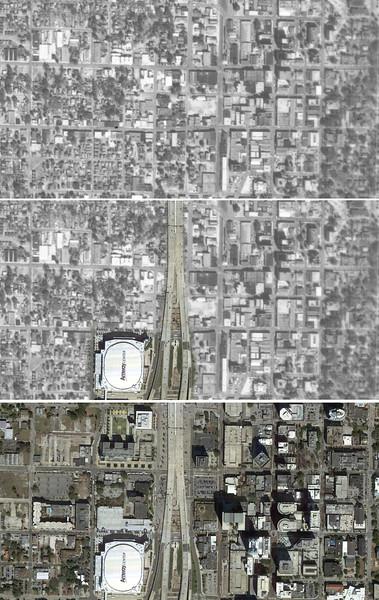Transforming Urban America: Navigating Economic Inequality and Social Change in Modern Cities
Economic Inequality Sparks Renewed Urban Unrest Across U.S. Cities
Across the United States, metropolitan areas are witnessing a resurgence of social unrest fueled by widening economic disparities. This unrest is not isolated but symptomatic of entrenched systemic challenges where stagnant wages, housing instability, and limited employment opportunities intersect, creating heightened social tensions. Cities that once flourished on industrial and manufacturing sectors now confront the harsh realities of automation and global economic shifts, leaving many workers marginalized and disillusioned.
Recent data from key urban centers illustrate the severity of these economic pressures:
| City | Unemployment Rate (%) | Median Household Income ($) | Percentage of Income Spent on Housing (%) |
|---|---|---|---|
| Detroit | 13.1 | 35,500 | 49 |
| Baltimore | 11.7 | 37,800 | 52 |
| Chicago | 10.2 | 40,900 | 46 |
| Atlanta | 9.6 | 41,200 | 48 |
Community advocates and policymakers emphasize that addressing these challenges requires extensive strategies, including:
- Enhancing education and vocational training programs aligned with evolving job markets.
- Expanding affordable housing projects to reduce the financial strain on low-income families.
- Reforming policing practices to foster transparency, accountability, and community trust.
How Urban Policy Shortcomings Have Exacerbated Social Instability
Long-term neglect and ineffective urban policies have compounded the difficulties faced by many American cities,setting the stage for the current wave of social unrest. Chronic underfunding in critical areas such as affordable housing, public transit, and essential services has deepened economic divides and fragmented communities. These policy failures disproportionately affect vulnerable populations, intensifying mistrust toward government institutions and fueling social discord.
Major contributing factors include:
- Housing Affordability Crisis: Escalating rental prices and a dwindling supply of affordable homes have led to increased displacement and homelessness.
- Public Safety Challenges: Budget cuts and contentious reform debates have strained relationships between law enforcement and communities.
- Deteriorating Infrastructure: Aging transportation systems and public facilities struggle to accommodate growing urban populations, limiting economic opportunities.
| Policy Sector | Funding Change Over Decades | Urban Impact |
|---|---|---|
| Affordable Housing | ↓ 27% | Increased homelessness and displacement |
| Public Transit | ↓ 20% | Reduced accessibility and job mobility |
| Public Safety | Fluctuating & Controversial | Heightened mistrust and violence |
Empowering Communities: Grassroots Solutions to Restore Safety and Trust
In response to institutional shortcomings, grassroots organizations across urban America are pioneering innovative, community-driven approaches to public safety and social cohesion. These initiatives harness local insights and foster collaboration, offering alternatives to traditional law enforcement that resonate more effectively with residents. Programs such as neighborhood mediation, youth leadership advancement, and community resource centers are demonstrating measurable success in reducing violence and building trust.
- Conflict Resolution Teams: Volunteer groups trained to de-escalate disputes before they escalate.
- Youth Leadership Initiatives: Engaging young people as proactive agents of peace and dialog.
- Community Support Centers: Providing services addressing underlying issues like poverty, mental health, and substance abuse.
| Program | Location | Outcomes |
|---|---|---|
| Peacekeepers Alliance | Chicago | 40% reduction in gun violence |
| Oakland Youth Peace Project | Oakland | 30% decrease in violent incidents |
| Philadelphia Mediation Network | Philadelphia | 600+ conflicts resolved annually |
Strategic Policy Directions for Equitable and Enduring Urban Development
Addressing the multifaceted challenges facing American cities demands a comprehensive policy framework centered on equity, sustainability, and innovation. Prioritizing investments in affordable housing, particularly through incentives for mixed-income developments, can mitigate segregation and displacement. Revitalizing public transit infrastructure is critical to reducing car dependency and enhancing accessibility for all residents. Moreover, integrating climate resilience into urban planning will protect communities from environmental threats while promoting healthier, greener public spaces.
Effective urban policy should also foster collaboration among government entities, private sector partners, and local communities to tailor solutions that meet specific neighborhood needs.Key policy initiatives include:
- Inclusive Zoning Reforms: Encouraging higher density and preserving cultural diversity within neighborhoods.
- Workforce Development Expansion: Aligning training programs with emerging sectors in the urban economy.
- Smart City Technologies: Utilizing data and technology to optimize public services and resource management.
| Policy Focus | Objective | Primary Action |
|---|---|---|
| Housing | Enhance affordability | Increase subsidies and enforce inclusionary zoning |
| Transportation | Improve accessibility | Invest in public transit and cycling infrastructure |
| Environmental Resilience | Strengthen climate adaptation | Incorporate green infrastructure and sustainable design |
| Economic Equity | Promote inclusive growth | Support targeted workforce training and job creation |
Conclusion: A Critical Juncture for Urban America
As American cities confront challenges reminiscent of the social upheavals of the 1960s,the urgency to understand and address the underlying economic and social forces has never been greater. The current wave of unrest and transformation signals a pivotal moment, demanding concerted efforts from policymakers, community leaders, and citizens. By tackling systemic inequalities and fostering resilient, inclusive urban environments, the nation can pave the way for a more equitable and sustainable urban future.





